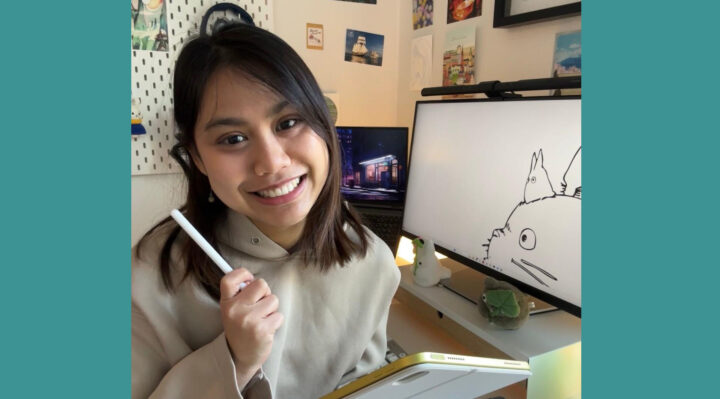Sopitta Thurachen found a way to combine her interests and educational background in the DIWA PhD pilot
Freshwater Competence Centre and Digital Waters flagship are not only about hydrology and physical or natural sciences research on our water reserves – we have a particularly strong and devoted research team working on the digitalization part: the sensor technology, robotics and automatization. Innovative research requires diverse skills, diverse interests and cross-scientific approaches, which is why the following story about Sopitta Thurachen, one of our new PhD Pilot doctoral researchers combining different fields of expertise, interests and even her hobbies, represents our work so well. She is doing her PhD divided between two organizations, University of Turku and Finnish Geospatial Research Institute FGI.
We are currently accepting applications for PhD positions in the Digital Waters PhD Pilot in our partner universities and research organizations! Read more about the positions and apply at https://digitalwaters.fi/phd-pilot/apply/ to become part of the Digital transition of Finnish water research.
Bringing the “Digital” in the “Digital waters flagship”
Sopitta Thurachen is one of the scientists who are bringing the “Digital” in “Digital Waters”. The interview was breathtakingly impressive. Long story in short: Sopitta started her educational path with a bachelor’s degree in electrical & control engineering in her home country Thailand. She got into robotics after participating in a robotics lab with a particularly inspiring professor, and started thinking that the software part of robotics is also rather a cool topic. She picked up a hobby of learning python programming on the side or her job at the time.
“In my Bachelor’s we learned C++ and I was not very good at programming with it. But with my interest in robotics, I also wanted to learn the programming and automation.” Sopitta tells. “I had a lot of fun learning Python and it was also for career advancement, so yeah, it was a hobby for me.”
Finland is a country of safety, nature and flexible curriculums
Sopitta had also developed an interest to Finland and Nordic countries in general. The lifestyle, the safety and peacefulness of the society and the closeness to nature appealed to her, so she started applying to Masters degrees in Nordic countries. “On the website they say Finnish people are quiet and reserved, that they don’t talk very much, but there are a lot of very talkative Finnish people in the end of the day!” she describes the experience.
Aalto university, with the flexibility it offers in choosing the study path and the electives was the school of choice for her. “Even if you study Robotics as major, you could even pick classes in art, if that’s what interests you!” Sopitta explains. “So that allowed me to take machine learning and deep learning as minors alongside my robotics major, and it’s just a nice way to transition into data analytics, computer vision and point cloud data.”
Sopitta got a couple of internships and summer jobs in research groups working with data science and point cloud data, and soon heard from a colleague about the Finnish Geospatial Research Institute FGI, the internationally acclaimed research institute for studying laser scanning and point clouds, among many other things. She started working at the FGI two years ago, with the Freshwater Competence Centre projects “GreenDigiBasin and HydroRIPlatform”, developing automatic land cover classification for fluvial environments using deep learning methods on multispectral 3D point cloud data.
DIWA PhD Pilot supports PhD projects supervised between multiple organizations
Finnish Geospatial Research Institute FGI research professors Harri Kaartinen and Antero Kukko have been developing the multispectral point cloud data collecting for years, if not decades, so there has been plenty of data for Sopitta to work and play with. Harri Kaartinen will also be one of her PhD supervisors, in the PhD project that Sopitta will start at the University of Turku in January 2025, in the Turku Intelligent Embedded and Robotic Systems Research Group lead by Professor Tomi Westerlund. She is quite excited to move on to this new PhD phase, as in the new position, she gets to work also with real time or near-real time algorithm development, and perhaps get a little more hands on also with the robotics and hardware side, working with the autonomous surface vehicle of the University of Turku. “I get to maybe program something that will be deployed on the autonomous boat, it is something I’m excited about, yeah”. She says. “At the University of Turku, I have more access to the expertise in the robotics and computer science, so they would add that to the expertise of FGI in the remote sensing, and multi spectral point clouds.”
OK, so this is like really the career move that will combine somehow both of the things that you have studied in the past and what you’re interested in?
“Yeah. It’s amazing”.

